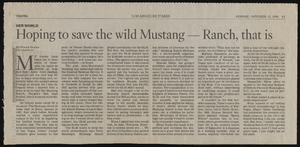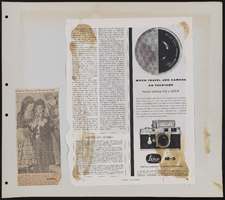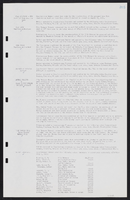Search the Special Collections and Archives Portal
Search Results
Kalaoram, Stella, 1969-
“Every Monday I will be at the union, like right now, helping the grievance team. If you’re asking for memories, no. It’s memories every day for me.”
Person
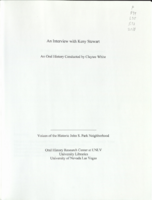
Transcript of interview with Keny Stewart by Claytee White, January 16, 2010
Date
Archival Collection
Description
Keny Stewart often sits in his backyard and hears the train whistle. In that moment he thinks about what Las Vegas must have been like in the 1940s—a moment made more meaningful by living in historic John S. Park Neighborhood. He enjoys his place, a place he has called home for 20 years. He was there for the beginning of the neighborhood "renaissance". Keny moved from California to Las Vegas in 1984 to work as an entertainer. One day a few years later he accidentally drove through John S. Park neighborhood, admired the architecture of the homes and the nostalgic feeling. Soon he was a homeowner, restoring his investment, a labor of love. At the time he worked nights on the Strip and restored his house day. Along the way he made a career change to educator/librarian for grade school level. He is a former neighborhood association president. He remembers the neighborhood's battle to maintain its integrity as it went up against local casino developer Bob Stupak's (whose home i
Text
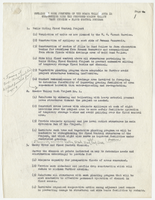
Outline of work projects of the Moapa Valley area in conjunction with the proposed Meadow Valley Wash erosion-flood control program, circa 1935
Date
Archival Collection
Description
Summary of projects and their respective projected costs for erosion-flood control projects in the Moapa Valley
Text

Transcript of interview with Geoconda Arguello Kline by Claytee D. White, September 18, 2014
Date
Archival Collection
Description
Text

Eric Calvillo interview, June 18, 2019: transcript
Date
Archival Collection
Description
Interviewed by Monserrath Hernández and Laurents Bañuelos-Benitez. Eric Calvillo was born into a Mexican American household in San Jose, California in 1980. As he recalls, it was there that his fixation with the colors and recurring themes of his family's Mexican roots told hold of his imagination. Today, this is core to his growing art career. Art has not been his sole ambition. Before moving to Las Vegas in 2005, Calvillo attended a San Francisco culinary school. He relocated to Las Vegas to complete his culinary internship at the prestigious Picasso restaurant at the Bellagio. Eventually, he began to pursue a professional art career as a painter of Día de los Muertos motifs and beautifully portray the Mexican tradition of celebrating the lives of the deceased. Through his use of acrylics and oil on canvas, Calvillo conveys the emotion of his culture and then, being a skilled carpenter, crafts his own frames.
Text
Gene Hertzog Professional Papers
Identifier
Abstract
The Gene Hertzog Professional Papers (approximately 1930-2015) are comprised of photographs, slides, transparencies, publications, video cassettes, correspondence, and digital files spanning Gene Hertzog's working years with the United States Army, the Bureau of Reclamation, and as a freelance photographer and videographer based in Southern Nevada, New Mexico, and Washington state. The collection documents the complicated infrastructure required to supply water to the Las Vegas Valley and includes still and moving images of the Springs Preserve, Lake Mead National Recreation Area, the Colorado River, and the Columbia Basin. The majority of the collection comes from Hertzog's time as a regional photographer for the Bureau of Reclamation and offers a unique glimpse into the Bureau's work in Southern Nevada, the southwest, and the Pacific Northwest from the 1950s to the mid-1990s.
Archival Collection

